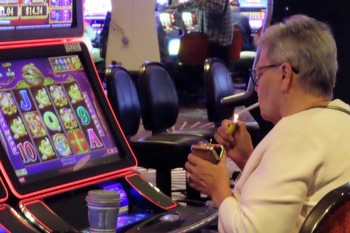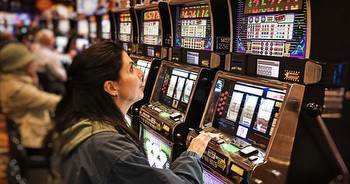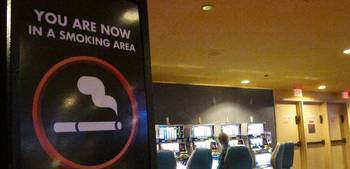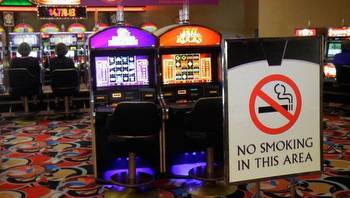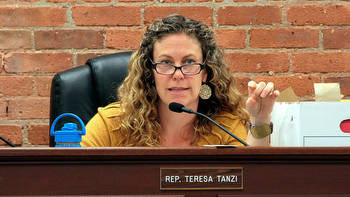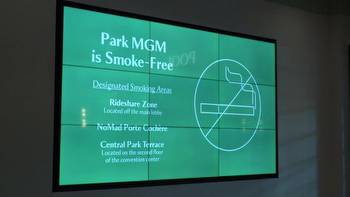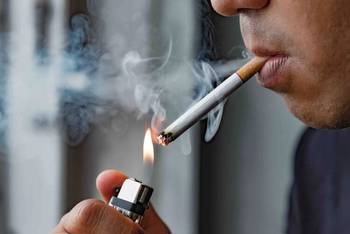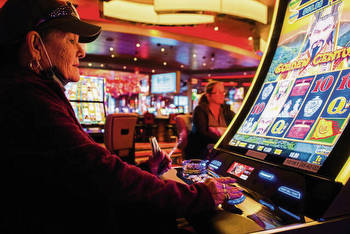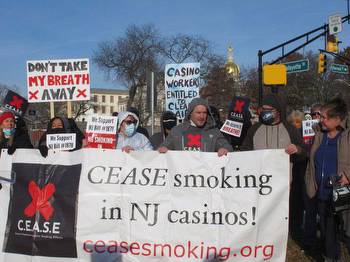Commission won't pursue a casino smoking ban

Much has changed since the St. Jo Frontier Casino first opened for business in 1994.
The riverboat no longer paddles up and down the Missouri River, it’s no longer docked Downtown and gamblers aren’t limited to $500 in losses during a two-hour period. One thing has remained constant: It’s perfectly legal for someone to light up and smoke a cigarette while playing slots or blackjack.
“Part of the enjoyment of going to the casino has been being able to smoke,” said Mike Leara, chairman of the Missouri Gaming Commission. “A lot of them have restrictions on where you can smoke.”
For some, that’s not enough. Efforts to ban smoking at the Frontier Casino are as old as the city’s smoking ban itself, which passed in 2014 with 52% voter approval. That ban includes a casino exemption, as do smoke-free ordinances in Kansas City and St. Louis.
In May, Councilman P.J. Kovac’s attempt to prohibit smoking at the Frontier Casino did not gain support from the full council. Some feared a smoking ban would put the St. Joseph casino at a competitive disadvantage with nearby casinos and possibly jeopardize the $800,000 in revenue that the city receives for things like festivals, economic development and historic preservation.
Now one anti-smoking advocate is urging a statewide solution. If a smoking ban puts one casino at a competitive disadvantage, why not ban smoking at all of Missouri’s 13 riverboat casinos?
“They are interested in profits over health,” said Stan Cowan, a retired public health official with the University of Missouri. “Is a casino worker’s health considered less valuable?”
To Cowan, it’s not enough to enter the casino floor and notice that the air seems smoky or clean. He cites a 2014 University of Missouri Health System study that measured particulate matter pollution at nine casinos in Missouri, including both smoking and non-smoking areas on some facilities. The casinos were not individually named.
The study found that in 10 sections that allowed smoking, the particulate pollution level was rated 74 and the average air quality index was considered unhealthy, based on Environmental Protection Agency standards. In non-smoking sections, particulate matter averaged 23 and the air-quality rating was moderate.
“When you walk into a place and you smell it, that’s a sign of secondhand smoke,” Cowan said. “The absence of odor doesn’t mean it’s good air quality. Many of the compounds of secondhand smoke do not have an odor.”
Cowan said state statute requires the Gaming Commission to assure that casinos are not operating in a way that is harmful to the public. He said that includes air quality.
“Exposure to secondhand smoke is an unnecessary risk,” he said. “The commission has a very clear statutory obligation on this.”
Leara, the commission chairman, said any decision on smoking is up to the casinos and the cities where they operate.
“That’s a business decision that casinos would have to make,” he said. “I do not smoke. I am not a fan of it. But I don’t think our position as regulators is to impose health restrictions as it relates to smoking.”
Pat Conway, a former St. Joseph state representative who also serves on the gaming commission, said a smoking ban would hurt casino revenues just as many facilities are starting to recover from the pandemic. In St. Joseph, the city’s riverboat revenue was down about $40,000 last year because of COVID-19 and its impact.
“If the legislature or the executive wanted to do something, I guess they could,” Conway said. “But right now we’re going to leave it up to the individual communities.”
He said the St. Joseph facility has tried to give options to its patrons with a nonsmoking section for casino games and a ban on smoking in non-gambling areas like restaurants.
The St. Joseph smoking ban also includes “trigger language” that would prohibit smoking on the Frontier Casino if a smoking ban is ever enacted at gambling facilities in the Missouri counties of Clay, Jackson and Platte and the Kansas counties of Johnson and Wyandotte.
Conway said probably won’t happen any time soon.
“I think smoking will change again in the next decade just as it has in the last 20 or 30 years,” he said.








